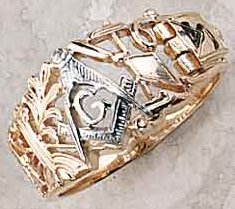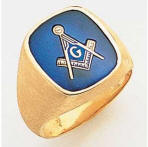For more information, see:
Related Topics:

A question which has been posed MANY times over the years of this website's existence relates to the wearing of a Masonic ring from a now-deceased relative. Men - and sometimes women - want to honor the memory of a grandfather or some other beloved family member by wearing a ring which meant so very much to them.
![]()
 The
question never arises from Masons: they're entitled to wear that emblem and
having a ring with a connection to someone who had 'traveled' as a Mason before
is just one more link in an indissoluble chain linking members for over three
centuries. For the non-Mason, though, it's a different matter.
The
question never arises from Masons: they're entitled to wear that emblem and
having a ring with a connection to someone who had 'traveled' as a Mason before
is just one more link in an indissoluble chain linking members for over three
centuries. For the non-Mason, though, it's a different matter.
Minimizing the feelings, real or imagined, that one has for a deceased relative is not our intent. We would, however, encourage you to consider for a moment just exactly what made HIS ring important to HIM!
How did he get it? Was it a present from his wife? Perhaps it was given to him by his lodge for exceptional service. Maybe he bought it himself after a lengthy period of saving. Rarely is this background known and thus it's importance (and, dare we suggest, a great portion of his affection for it) has already been lost.
Regardless of how he came by it, we do know that it was a singularly important possession. It reminded him of the ceremonies through which he had passed, the promises he had made before his Maker and before his lodge, and it served as a constant reminder to strive to be better each and every day. Does it mean all this to you? It did to him!
If this relative was a police officer, for example, would you wear his badge on your shirt? Not likely. Why? Because - to begin - there are laws which prohibit a person from 'pretending' to be a police officer. There are no such laws governing the wearing of Masonic regalia but why would you feel the need to pretend to be something you're not: a Freemason!
 I
know, I know: you're not pretending. You're simply remembering that favorite
relative. But does the world know that? If you're a man and are wearing a
Masonic ring, what's the assumption that everyone will - probably quite rightly
- make? Sure, they shouldn't - but they do. Are you going to live up to the high
ideals expected of a Mason - when you know nothing whatsoever about them? Will
you come to the aid of a distressed Brother Mason when you have no idea that
it's expected of you?
I
know, I know: you're not pretending. You're simply remembering that favorite
relative. But does the world know that? If you're a man and are wearing a
Masonic ring, what's the assumption that everyone will - probably quite rightly
- make? Sure, they shouldn't - but they do. Are you going to live up to the high
ideals expected of a Mason - when you know nothing whatsoever about them? Will
you come to the aid of a distressed Brother Mason when you have no idea that
it's expected of you?
And finally, let me assure you without fear of correction from ANY Mason: there is NO Mason who would want a non-Mason to wear their ring REGARDLESS of the motivation. Period.
They EARNED the right to display the square and compasses or any of the other Masonic emblems. They were investigated by Masons and found worthy to join. You have not met that threshold - and you're not entitled.
While it's understandable that some will have a strong impulse to remember a deceased relative by wearing something that meant SO much to him, he would not want you to do it. Period.
And also below is a little tale that might make you think also....
Why Did You?
This story has been oft passed around and, regrettably, the author is unknown.
A young man passed a pawnbroker's shop.
The money lender was standing in front of his shop, and the young man noted that
he was wearing a large and beautiful Masonic emblem. After going on a whole
block, apparently lost in thought, the young man turned back, stepped up to the
pawnbroker, and addressed him: "I see you're wearing a Masonic emblem. I'm a
Freemason too. It happens that I'm desperately in need of $25 just now. I shall
be able to repay it within ten days. You don't know me; but I wonder whether
the fact that you are a Freemason and that I am a Freemason is sufficient to
induce you to lend me the money on my personal note."
The pawnbroker mentally appraised the young man, who was clean cut, neat and
well-dressed. After a moments thought, he agreed to make the loan on the
strength of the young man being a Freemason. Within a few days the young man
repaid the loan as agreed and that ended the transaction.
About four months later the young man was
in a Lodge receiving the Entered Apprentice Degree; he had not really been a
Mason when he borrowed the $25. After he had been admitted for the second
section of the degree, the young man looked across the Lodge room and saw the
pawnbroker from whom he had borrowed the $25. His face turned crimson and he
became nervous and jittery. He wondered whether he had been recognized by
the pawnbroker. Apparently not, so he planned
at the first opportunity to leave the Lodge room and avoid his benefactor.
As soon as the Lodge was closed he moved quickly for the door, but the
pawnbroker had recognized the young man, headed him off and, to the young man's
astonishment, approached him and greeted him with a smile and outstretched hand.
"Well, I see you weren't a Freemason after all when you borrowed that $25," the
pawnbroker commented. The blood rushed to the young man's face as he stammered,
"No, I wasn't, but I wish you'd let me explain. I had always heard that
Freemasons were charitable and ready to aid a Brother in distress. When I
passed your shop that day I didn't need that $25. I had plenty of money in my
wallet, but when I saw the Masonic emblem you were wearing, I decided to find
out whether the things I'd heard about Freemasonry were true. You let me have
the money on the strength of my being a Freemason, so I concluded that what I
had heard about Masons was true, that they are charitable, that they do aid
Brethren in distress. That made such a deep impression on me that I presented
my petition to this Lodge and here I am. I trust that with this explanation you
will forgive me for having lied to you."
The pawnbroker responded, "Don't let that worry you too much. I wasn't a
Freemason when I let you have the money. I had no business wearing the Masonic
emblem you saw. Another man had just borrowed some money on it, and it was so
pretty that I put it on my lapel for a few minutes. I took it off the moment you
left. I didn't want anyone else borrowing money on the strength of my being a
Freemason. When you asked for that $25, I remembered what I had heard about
Masons, that they were honest, upright, and cared for their obligations
promptly. It seemed to me that $25 wouldn't be too much to lose to learn if what
I'd heard was really true, so I lent you the money and you repaid it exactly as
you said you would. That convinced me that what I'd heard about Masons was true.
I was the candidate just ahead of you."
Created 1 November 2012 with 'Why Did You' added 26 January 2013







